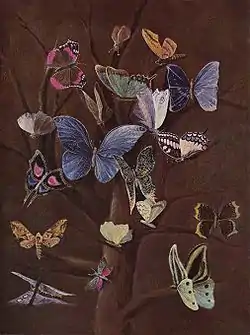бабочка

Бабочки.
Russian
Etymology
ба́бка (bábka, “old woman, grandmother”) + -ка (-ka), originally a diminutive; from the folk belief that spirits of the dead live on as butterflies.
Pronunciation
- IPA(key): [ˈbabət͡ɕkə]
Audio (file)
Noun
ба́бочка • (bábočka) f anim or f inan (genitive ба́бочки, nominative plural ба́бочки, genitive plural ба́бочек)
Usage notes
Russian does not divide butterflies and moths the same way English does. Russian has мотылёк (motyljók) for a kind of small moth that swarms at night, and моль (molʹ) for the moth that eats clothes, but the other moths are all ба́бочки (bábočki).
Declension
Declension of ба́бочка (bian fem-form velar-stem accent-a reduc)
| singular | plural | |
|---|---|---|
| nominative | ба́бочка bábočka |
ба́бочки bábočki |
| genitive | ба́бочки bábočki |
ба́бочек báboček |
| dative | ба́бочке bábočke |
ба́бочкам bábočkam |
| accusative animate inanimate |
ба́бочку bábočku |
ба́бочек báboček |
| ба́бочки bábočki | ||
| instrumental | ба́бочкой, ба́бочкою bábočkoj, bábočkoju |
ба́бочками bábočkami |
| prepositional | ба́бочке bábočke |
ба́бочках bábočkax |
References
- Vasmer (Fasmer), Max (Maks) (1964–1973), “бабочка”, in Etimologičeskij slovarʹ russkovo jazyka [Etymological Dictionary of the Russian Language] (in Russian), translated from German and supplemented by Trubačóv Oleg, Moscow: Progress
This article is issued from Wiktionary. The text is licensed under Creative Commons - Attribution - Sharealike. Additional terms may apply for the media files.